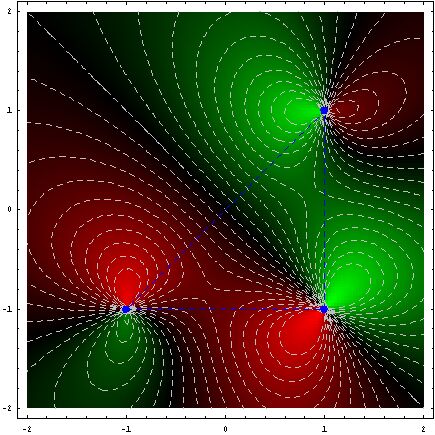Consider two point masses P1 and P2 in the plane moving with instantaneous velocities:

Consider the Euclidian distance:
![]()
These points will be approaching (resp. moving away from) each other if the time derivative of the above function is negative (resp. positive), i.e.:
![]()
Given a point C in the plane, specify n1, n2 as infinitesimal flows over a non-linear rotational field:

The question we have ask is, given fixed mass locations P1 and P2, what is the locus of C points which, under the above flow, causes P1 and P2 to approach each other?
The answer, which can be derived analytically, yields the following interesting result. Let L1 be a straight line passing thru P1 and P2. Let L2 be a straight line perpendicular to L1, passing thru the mid point of segment P1P2. These two lines will divide the plane into four quadrants Q1 thru Q4. P1 will approach (resp. move away from) P2 after a counterclockwise flow about C if C lies in Q2 or Q4 (resp. Q1 or Q3).
This result is illustrated below for P1=(-1,-1) and P2=(1,1). The coloring corresponds to the dot product (P1-P2).(v1-v2), mapped thru the colormap shown below the picture. Black corresponds to zero change in distance; bright red (resp. blue) corresponds to large decreases (resp. increases) in relative distance. The green lines mark the no-change-in-distance regions.

Another interesting test is that of "area shrinkage" -- given the point masses and the associated triangle connecting them, how does the position of C affect the area of the new triangle after an infinitesimal flow about C? Since the area test is a simple (and linear) cross-product, the analysis is simple. A good visualization of this phenomenon is shown below (here the blue hue has been replaced by green). Also shown are level curves for C positions which result in the same shrinkage/expansion of the triangle area.

| The above graphs were developed with Mathematica 3.0. The input code is here. | |
| The Equations have been rendered with Equation Magic. The input files are here. |